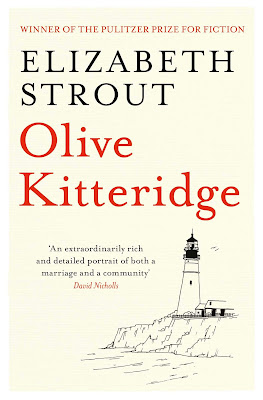20 Books of Summer: Olive Kitteridge by Elizabeth Strout
Elizabeth Strout won the 2009 Pulitzer Prize for Fiction
with this novel – a novel which is really a collection of interlinked short
stories about some of the people inhabiting a small community on the coast of Maine.
Strout’s observations are sharp and accurate, her writing is skilled and fluent,
but once again I find myself asking why every prize-winning book seems to have
to be so miserable.
The titular character, Olive, is a retired teacher living with her patient
husband Henry in the small community of Crosby. Henry is
also retired, and was previously the town’s pharmacist. Olive is snippy, bad
tempered, impatient and critical of others; Henry is optimistic, friendly, and
wants everyone to be happy. Has Olive always been this way, or has life brought
her to this point, a point at which she no longer cares what she says or to
whom she says it?
And quite honestly, how does Henry put up with her? Is it just force of habit?
Circling around Olive are a large cast of characters, many of whom merit their
own stories. The book opens with Henry himself, at a time when he was still working.
He enjoys being the local pharmacist, knowing everyone, trying to ease their
physical and psychological woes. But Henry too has his issues – his own mother
had two nervous breakdowns during his childhood – so no wonder he wants
everything to run smoothly now.
When Henry’s longtime assistant dies he employs Denise, a much younger (married)
woman. Olive is instantly critical and doesn’t want to have the couple over for
dinner, but Henry is so taken with their youth and enthusiasm for life that he
invites them anyway. Olive serves up baked beans followed by one scoop each of vanilla
ice cream. And loses her temper when Henry accidentally spills the ketchup.
As the months roll on Henry likes Denise and her husband more and more, and
Olive becomes ever more irascible. She refuses to go to church with Henry;
‘You, Mr Head Deacon Claptrap nice Guy, expect me to give up my Sunday mornings to go sit among a bunch of snot-wots!...Well, I’m sick and tired of it.’ she’d said, calmly, ‘Sick to death.'And yet, when tragedy strikes Denise, Olive is truly horrified;
‘Oh, you poor child,’ she said, in a voice Henry would always remember – filled with such dismay that all her outer Olive-ness seemed stripped away, ‘You poor, poor child.’And that is the conundrum of Olive. She is difficult, volatile, rude and selfish, yet at times she can be kind, caring and thoughtful. And Henry knows this; they have been together so long that although they bicker, they each care about the other. They are aware of infidelities, they are annoyed by each other’s habits, but in the end they need, indeed they probably love, one another.
Other stories focus on other people; a suicidal man - whom Olive recognises as one of her former pupils - whose family has suffered the tragic consequences of mental illness (for this is a recurrent theme, Olive’s own father having shot himself while suffering from depression), a faded pianist who plays at the local bar every night then goes home alone.
They are
all portrayed with Strout’s expertise, her ability to convey so much in such a
short phrase;
…when she sat at the piano bench she did so with the grace of a baller dancer, albeit past her prime.
But here they were, and Olive pictured two slices of Swiss cheese pressed together, such holes they brought to this union - what pieces life took out of you.
But for me there are just too many ‘literary’ paragraphs. There is much description of the sea, the waves, the harbour, boats. Olive and Henry drive up and down the coast road ad nauseum. And because this book is firmly in the Literary tradition, the descriptions are overworked; I grew tired of hearing about the wind whipping up the waves, the trees bent over, the ground soggy from snow.
It feels at times as if a pall of inertia is hanging over
Olive and all of her acquaintances; everything seems very still, even when
Olive is having a rant, or trashing the contents of the wardrobe of the woman
who had just married her son. This book is about life, every reader will probably
recognise some experience that they themselves have had – but there is no
levity to it, no humour to lighten the load of sadness, just a quiet
resignation to the fact that this is our inescapable burden.
So, top marks for skill and style, but these unfortunately weren’t enough
to make me enjoy reading about Olive, Henry, and the rest of Crosby’s largely miserable
residents.



Comments
Post a Comment